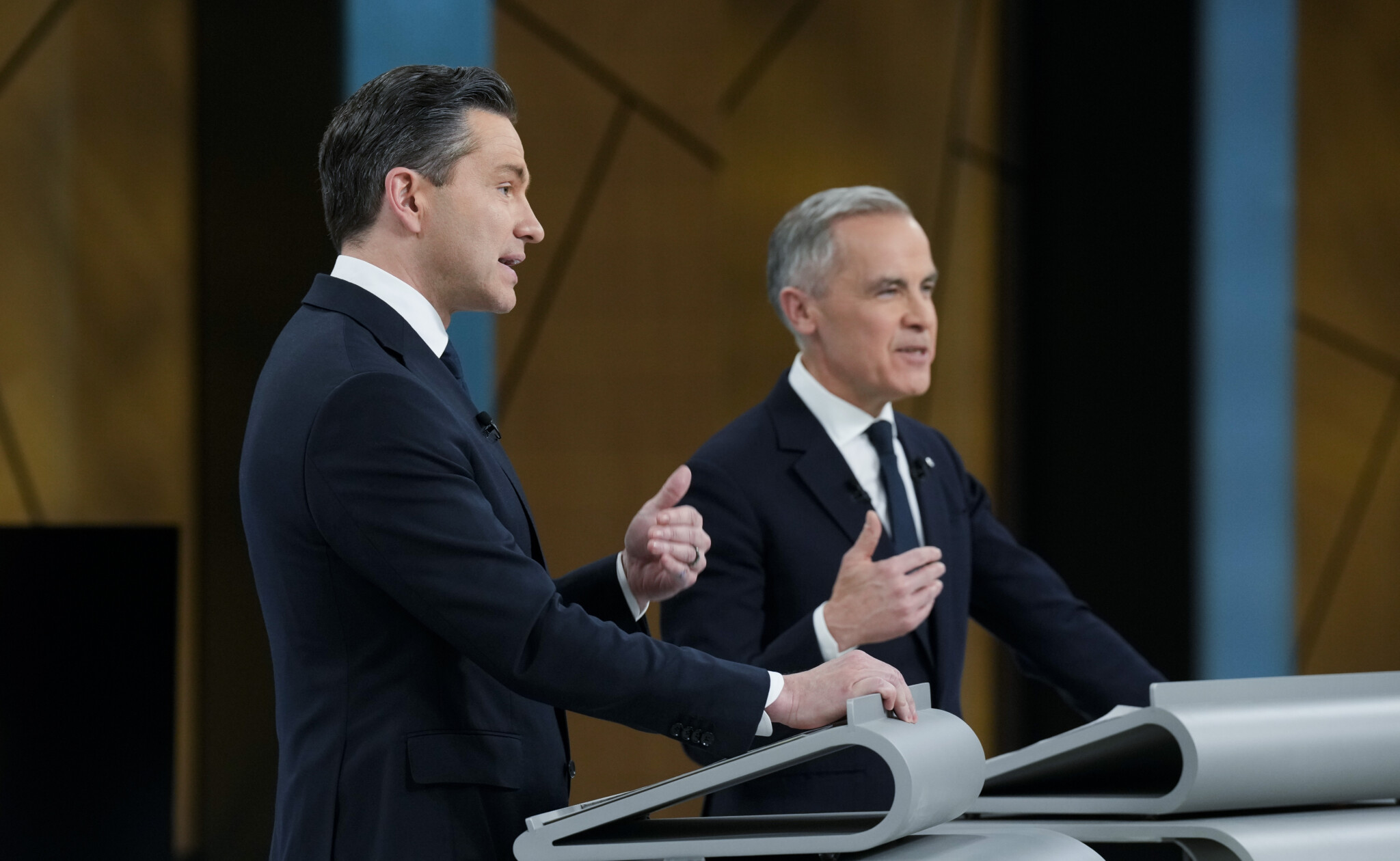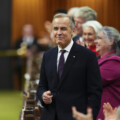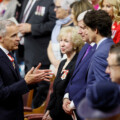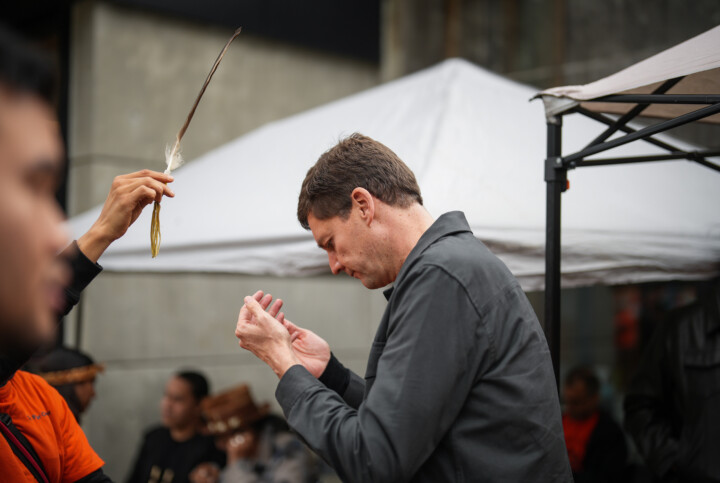In The Weekly Wrap, Sean Speer, our editor-at-large, analyses for Hub subscribers the big stories shaping politics, policy, and the economy in the week that was.
Both Poilievre and Carney showed their strengths—and weaknesses— this campaign
As we enter the final weekend before election day, we can say that we’ve learned some things about the two front-runners, Mark Carney and Pierre Poilievre. What’s interesting is that their personal strengths and weaknesses in the campaign have proven to be two sides of the same coin.
For Carney, he’s shown himself to be more adept at politics than some—even many—anticipated. Keep in mind that this is someone who officially entered electoral politics barely three months ago. A national election campaign is quite a crash course—particularly when your chief opponent has been honing his craft for two decades.
Carney’s performance in the English-language leaders’ debate is a good example. He wasn’t inspirational, but his workmanlike performance was effective. He acquainted himself reasonably well and in so doing probably exceeded expectations.
But if Carney’s strength was that he proved to be a politician in a positive sense, his weakness was that he showed himself to be a politician in all of its negative connotations. For someone whose carefully-engineered political persona is about his intellect and seriousness, he demonstrated that he wasn’t above the crass, lowest-common-denominator politics that his candidacy was supposed to transcend.
Remember, Carney launched his prime ministership by reversing the carbon tax—a policy that had been core to the Trudeau government’s agenda and Carney’s own pre-political advocacy. He then spent the campaign whipping up public emotions about the “biggest crisis of our lifetimes,” including regularly suspending his own efforts to remind us of it, and distributing fiscal largesse to client groups, including a one-time increase to old-age benefits that felt more like a campaign bribe than evidence-based policy.
These aren’t the actions of some high-minded technocrat. They reflect a win-at-all-cost ruthlessness that evidences Carney’s full evolution into a politician, for better or worse.
As for Poilievre, his greatest strength was his overwhelming enthusiasm and support among Conservative voters. No Conservative politician in my lifetime has engendered the kind of energy from his or her own base like he has.
Notwithstanding some of the carping about rally sizes, what we’ve witnessed in this campaign in events across the country was extraordinary. Poilievre’s connection with core Conservative voters is almost intuitive. He speaks to them in muscle memory.
Yet this too is probably his biggest weakness. Although he seems poised to make some gains with swing voters—particularly realignment voters in Northern Ontario and parts of the B.C. Lower Mainland—he’s set out to underperform with women and older voters who were ostensibly put off by his base-energizing presentation and tone.
It’s a reminder that in politics, like life, we often don’t have the option to cherry-pick. The parts of someone or something that we like are tied up in the parts that we don’t.
Voting is, if anything, an exercise in tradeoffs. On Monday, Canadians will decide whose combination of strengths and weaknesses makes them, on balance, the best fit to be prime minister. Let the imperfect leader win.
Canada needs more voices for growth
In a previous life, years and years ago, I was a young, aspiring economic historian focused on 20th-century economic policy and the relationship between business and government in Canada. My master’s thesis (which is far too embarrassing to read today) was on price and wage controls in the mid-1970s and their catalytic effect on the creation of the Business Council on National Issues—the precursor to today’s Business Council of Canada.
The subsequent 20 years were the high mark of business influence over Canadian public policy. A combination of factors was responsible, including the charisma and intellect of BCNI CEO Tom d’Aquino, the pro-business disposition of the Mulroney and Chretien governments, and a broader intellectual trend towards free trade, free markets, and less state intervention in the economy.
Fast forward to the present, and business finds itself in much more difficult circumstances. The rise of populism on both the Left and the Right, as well as employee activism within corporations themselves, has contributed to a diminished role for business leaders in our public life. Many entrepreneurs and CEOs have opted to choose the path of least resistance and recede from the public square altogether.
The result is that there are too few voices these days making the affirmative case for business and capitalism. The basic conditions for private sector investment and employment are increasingly the subject of inattention or even outright political hostility. And business leaders who are ostensibly invested in those conditions have been too averse to step into the fray in their defence.
One gets the sense, though, that something is changing. Over the past several weeks, we’ve seen separate initiatives—Build Canada and Canadians for Free Enterprise—champion the case for market-based reforms to boost Canadian productivity and prosperity.
These two projects differed in some key ways. Build Canada is fully non-partisan and comprises younger, more tech-related entrepreneurs. Canadians for Free Enterprise is composed of older, more established voices who ultimately chose to endorse Pierre Poilievre and the Conservatives.
But what makes them similar is that they both represent a renewed commitment on the part of Canadian business leaders from different backgrounds and sectors to contribute to the public debate about policy, politics, and Canada’s future. This is a positive development—particularly because their ideas and perspectives are hugely additive to our policy discourse.
Build Canada, in particular, has published several policy memos over the course of the campaign authored by leading entrepreneurs and technologists that have set out innovative and thoughtful policy ideas on topics ranging from immigration to energy to national service.
Its own polling conducted by Pollara Strategic Insights finds significant public support for its overall agenda. Seventy percent of Canadians, for instance, agree that the next government should prioritize long-term economic growth over investing in more social programs, and more than 80 percent support repealing outdated regulations and reducing government spending.
The same goes for Build Canada’s specific policy recommendations. More than 80 percent of Canadians want to get rid of interprovincial trade barriers, and 71 percent support fast-tracking energy projects. The list goes on.
The key insight from this polling is that there’s a potent yet untapped cross-ideological and partisan agenda focused broadly on what one might characterize as less friction and more growth.
More generally, though, the biggest contribution of Build Canada and Canadians for Free Enterprise is that they represent a renewed willingness on the part of Canadian entrepreneurs and business leaders to engage, to make the case for growth and prosperity, and to advance policy ideas that ultimately make the country richer and better.
One hopes that this is just the beginning. As the campaign wraps up, this diverse and multi-partisan group of entrepreneurs, technologists, and CEOs opts to stay in the arena. They’ve made a big contribution over the past several weeks, and their voices in our political life will be even more important in the coming years.
Best of luck, Bardeesy
It’s probably no surprise to readers that, notwithstanding the Conservative Party’s awful media policy, on balance I’d prefer that it wins Monday’s election. But that doesn’t preclude me from rooting for some Liberal candidates. In particular, I hope that Karim Bardeesy, the Liberal candidate in the riding of Taiaiako’n—Parkdale—High Park, wins his seat.
I’ve known Bardeesy for several years. He’s one of the kindest, most thoughtful, and well-meaning people that I’ve met in roughly twenty years in the world of policy and politics.
Bardeesy is a unique politician. He’s a committed progressive who travels comfortably in urban progressive circles. But he’s also a second-generation immigrant who grew up in New Brunswick and is highly attuned to the experiences and perspectives of new Canadians and those on the periphery. In a context of growing political fault lines, he’s precisely the kind of bridge builder that we need in elected politics.
Don’t get me wrong: we probably don’t agree on much. Most fundamentally, he’s more inclined to government intervention than I am.
But Bardeesy is smart and has a ton of integrity and would be hugely additive to parliament. Although I still hope his party loses Monday’s election, I’ll be rooting for him and Canada that he wins his seat.











